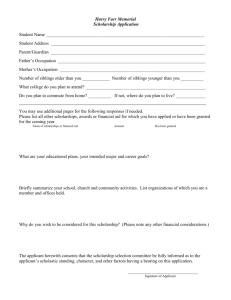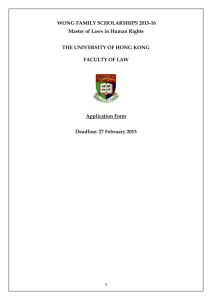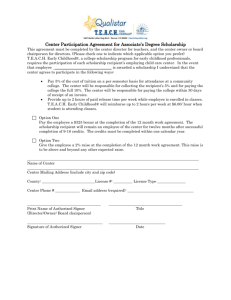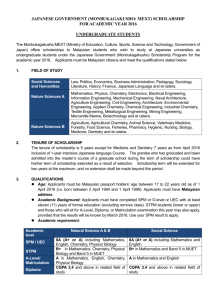JAPANESE GOVERNMENT (MONBUKAGAKUSHO: MEXT
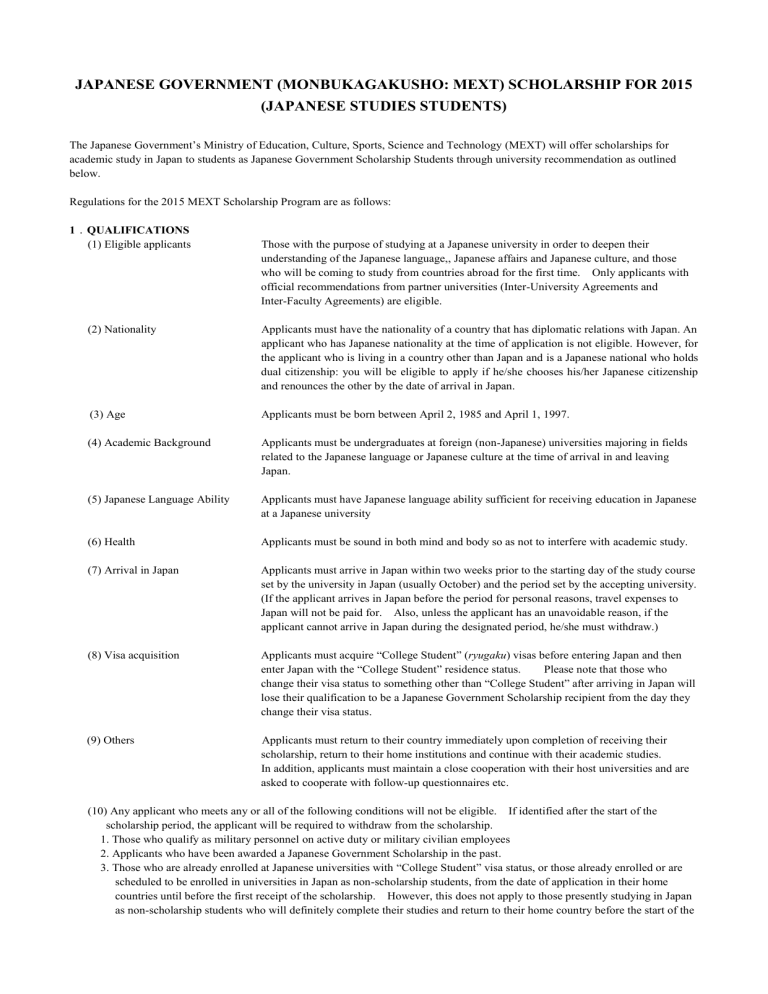
JAPANESE GOVERNMENT (MONBUKAGAKUSHO: MEXT) SCHOLARSHIP FOR 2015
(JAPANESE STUDIES STUDENTS)
The Japanese Government’s Ministry of Education, Culture, Sports, Science and Technology (MEXT) will offer scholarships for academic study in Japan to students as Japanese Government Scholarship Students through university recommendation as outlined below.
Regulations for the 2015 MEXT Scholarship Program are as follows:
1
.
QUALIFICATIONS
(1) Eligible applicants Those with the purpose of studying at a Japanese university in order to deepen their understanding of the Japanese language,, Japanese affairs and Japanese culture, and those who will be coming to study from countries abroad for the first time. Only applicants with official recommendations from partner universities (Inter-University Agreements and
Inter-Faculty Agreements) are eligible.
(2) Nationality Applicants must have the nationality of a country that has diplomatic relations with Japan. An
applicant who has Japanese nationality at the time of application is not eligible. However, for the applicant who is living in a country other than Japan and is a Japanese national who holds dual citizenship: you will be eligible to apply if he/she chooses his/her Japanese citizenship and renounces the other by the date of arrival in Japan.
(3) Age
(4) Academic Background
Applicants must be born between April 2, 1985 and April 1, 1997.
Applicants must be undergraduates at foreign (non-Japanese) universities majoring in fields related to the Japanese language or Japanese culture at the time of arrival in and leaving
Japan.
(5) Japanese Language Ability Applicants must have Japanese language ability sufficient for receiving education in Japanese at a Japanese university
(6) Health
(7) Arrival in Japan
Applicants must be sound in both mind and body so as not to interfere with academic study.
Applicants must arrive in Japan within two weeks prior to the starting day of the study course set by the university in Japan (usually October) and the period set by the accepting university.
(If the applicant arrives in Japan before the period for personal reasons, travel expenses to
Japan will not be paid for. Also, unless the applicant has an unavoidable reason, if the applicant cannot arrive in Japan during the designated period, he/she must withdraw.)
(8) Visa acquisition Applicants must acquire “College Student” ( ryugaku ) visas before entering Japan and then enter Japan with the “College Student” residence status. Please note that those who change their visa status to something other than “College Student” after arriving in Japan will lose their qualification to be a Japanese Government Scholarship recipient from the day they change their visa status.
(9) Others Applicants must return to their country immediately upon completion of receiving their scholarship, return to their home institutions and continue with their academic studies.
In addition, applicants must maintain a close cooperation with their host universities and are asked to cooperate with follow-up questionnaires etc.
(10) Any applicant who meets any or all of the following conditions will not be eligible. If identified after the start of the scholarship period, the applicant will be required to withdraw from the scholarship.
1. Those who qualify as military personnel on active duty or military civilian employees
2. Applicants who have been awarded a Japanese Government Scholarship in the past.
3. Those who are already enrolled at Japanese universities with “College Student” visa status, or those already enrolled or are scheduled to be enrolled in universities in Japan as non-scholarship students, from the date of application in their home countries until before the first receipt of the scholarship. However, this does not apply to those presently studying in Japan as non-scholarship students who will definitely complete their studies and return to their home country before the start of the
2015 Japanese Studies Program.
4. Recipients of scholarships from institutions other than MEXT (including government institutions in their own countries) will not be selected. (This includes those scheduled to receive scholarships at the time of application and will continue to receive them after they come to Japan.)
5. Those who apply for this scholarship simultaneously through other universities or embassy recommendation, as well as the
Student Exchange Support Program (Scholarship for Short-term Study in Japan) conducted by the Japan Student Services
Organization (JASSO).
6. Those who have not studied Japanese at a university for more than one year as of April 2015 will not be eligible.
(For those who have studied Japanese at another university and the time spent studying there totals one year or more:
please submit a document [a transcript from a different university] which proves that you have been studying
Japanese for one year or more).
7. The applicant who is a Japanese national holding dual citizenship: you will not be eligible to apply if you cannot verify that you have renounced your Japanese citizenship by the date of arrival in Japan.
2. Term of Scholarship : The term is the period necessary to complete the host university’s study course, which should be within approximately one year from October 2015 (the starting month of the study course)..
(Note that an extension of the scholarship term will not be allowed.)
3. SCHOLARSHIP
(1) Allowance Actual amount of scholarship benefits: 117,000 yen per month
(2,000 yen or 3,000 yen per month will be added in the case where the recipient will study or do research in a designated area. Note that the monetary amount is subject to change due to budgetary reasons each year.)
However, the scholarship will be cancelled if the recipient is absent from the university temporarily or for an extended period of time.
The scholarship will be cancelled in the following situations. Moreover, if the recipient has been receiving the scholarship despite his/her falling under any of the following situations, he/she will be ordered to return the amount of scholarship that he/she has received during the period wherein he/she had been involved with any of the following situations.
1.
The recipient is judged to have made a false statement on his/her application.
2.
The recipient violates any article of his/her pledge to the Monbukagaku-daijin (Minister of Education,
Culture, Sports, Science and Technology).
3.
The recipient has been subjected to disciplinary action by the university such as being expelled or has been removed by the university register.
4.
It has been determined that it will be impossible for the recipient to complete the training course within the standard time period due to poor academic grades or suspension from the university.
5.
The recipient’s status, as defined in the Appended Table 1-4 of the Immigration Act, has been changed to one other than “College Student.”
6.
The recipient has received a scholarship from another institution (excluding those specified as being for research expenditures).
(2) Transportation
1. Transportation to Japan: The recipient will be supplied, according to his/her itinerary and route as designated by
MEXT, with an economy-class airplane ticket from the international airport nearest to his/her home* to Narita International (New Tokyo) Airport or any other international airport that the appointed university usually uses. Expenses such as inland transportation from his/her home address to the international airport, airport tax, airport usage fees, special taxes on travel, or inland transportation within Japan will NOT be supplied.
(*Note: the address in the country of the recipient’s nationality stated in the application form is in principle regarded as the recipient’s “home address.”).
2. Transportation from Japan: The recipient who returns to his/her home country within the month of the final scholarship will be supplied, upon his.her application, with an economy-class airplane ticket for travel from Narita International (New Tokyo) Airport or any other international airport that the appointed university usually uses to the international airport nearest to his/her home address.
(Note 1) Any aviation and accident insurance to and from Japan shall be borne by the recipient.
(Note 2) If the recipient plans to continue to stay in Japan after the completion of the program, travel fees for temporary visit to his/her country will not be paid for.
(3) Tuition etc.: Entrance examination fees, enrollment fees, tuition and other fees will be borne by the said university..
4. Recommendation procedures and selection
(1) Recommendation The president of each university will carefully screen and select especially outstanding applicants in need of financial assistance, send the necessary documents using the separate forms and submit the recommendations to the Minister of Education, Culture, Sports, Science and Technology. When making the recommendation, make sure to take the “Strategy on
Accepting Foreign Students to gain from the advancements of other countries” measure as well as priority regions into as much consideration as possible.
(Note) Osaka University will carry out preliminary screening prior to recommendation procedures by MEXT.
(2) Selection A Selection Committee will review and choose candidates for selection from the recommendations made by the head of each university, and based on this, the Ministry of
Education, Culture, Sports, Science and Technology will finalize its selection of candidates and the corresponding award periods.
(3) Documents to be submitted
1.
Documents that must be submitted by the applicant to Osaka University a.
Application (two-sided copying)…………………………………………………………………………………..1
*A photograph or digital image taken within the past 6 months, size 4.5x3.5 cm, upper half of body from
the front, with no head covering, name and nationality written on the back must be pasted on the application form……………………………………………………………………………………….…....1
b. Certificate of university enrollment………………………………………………………………………………...1
c. Certified academic transcript from the university the applicant is currently attending of every year
(copies are acceptable, please mark subjects related to Japanese language and Japanese culture)……………….1
d. Letter of Recommendation from the head of the university currently attending, addressed to the president of the university the applicant will be attending)……………………………………………………..1
e. Letter of Recommendation from academic advisor (using designated form)……………………………………….1
f. A copy of the applicant’s passport (the page with photo, nationality, date of issue/expiration) or family register…1
g. A document which proves that the applicant has been studying Japanese for one year or more
(this is only to be submitted by applicants whose transcript does not show that he/she has studied
Japanese for one year or more)……………………………………………………………………………………..1 h. Questionnaire for telephone interview (to be submitted via email or fax by March 5, 2015………..………..……1
(Note) Be sure to submit all the documents indicated in “1. Documents that must be submitted by the applicant to Osaka University” (a through h) to the address found at the end of this document.
These must be sent via post and received by March 11, 2015 (Wed.). If there should be a delay in arrival due to some unexpected reason, please send the documents via fax or email (PDF) before the deadline. The item h should be submitted via email or fax by March 5 (Wed.).
(4) Other notes i. The above documents must be drawn up in either Japanese or English and to the extent possible, drafted using a word processing software etc. and printed out on A4 paper. (For documents in other languages, a Japanese translation must be attached.) ii. Note that the application documents above will not be reviewed if: 1) they are incomplete, 2) they have not been completed correctly, or 3) required supplementary documents are missing. Moreover, application documents
submitted after the deadline will also be rejected (envelopes received with a postmark carrying the date of the deadline are accepted). iii. Submitted documents will not be returned under any circumstances. ix. Universities are responsible to verify that the applicants are in good health and that the applicant’s condition will not affect his/her academic studies at Osaka University.
5. Results
The president of each university will be notified of the results near the middle of June 2015.
(Note) Applicants will be notified of the results around the end of June, after the Ministry of
Education, Culture, Sports, Science and Technology has notified the head of each university.
6. Important Notes
(1) Universities that are scheduled to host international students should ensure that the students are entirely familiar with the award period, conditions attached to the scholarship, travel-related procedures (visa acquisition etc.) and the departure date as well as the differences between Japan and his/her country regarding the legislative system before they travel to Japan.
(2) The purpose of this scholarship program is not to obtain a diploma. Therefore, the recipient cannot be enrolled as an undergraduate at a university or as a graduate studying for his/her master’s degree or doctorate at a graduate school as a
Japanese-government-sponsored international student during this program or upon its completion.
(3) Universities should instruct students in advance regarding school-specific administrative procedures.
As your first scholarship allowance will be at the end of October, be sure to bring at least 1,000 USD for food, everyday supplies etc. to hold you through until then.
7. Other notes
(1) The host universities are responsible for the housing arrangements for candidates selected through university recommendation and should be arranged accordingly.
(2) Due to certain restrictions applicable in their home country, some candidates may not be able to leave their country despite being selected for a Japanese government scholarship. Universities should try to confirm whether such restrictions apply in advance. (Note that visa applications for international students from countries such as China, Russia and Myanmar take a substantial amount of time. Confirmation in advance should be carried out.)
(3) Note that recommendations for candidates who have previously been deported and for whom re-entry to Japan would prove difficult will be rejected.
(4) The request for the Provision of Convenience which may be attached to the “college student” visa application can only be accepted in the applicant’s home country (i.e. the country of which the applicant is a national). For applicants residing outside of their home country, the host universities should take responsibility and complete the procedure on their behalf.



